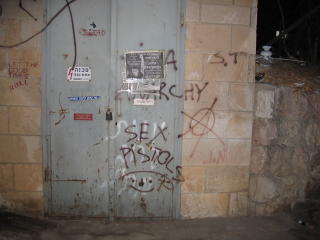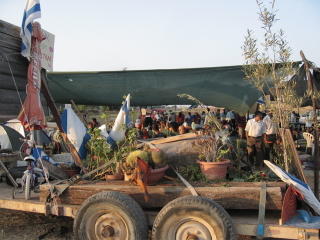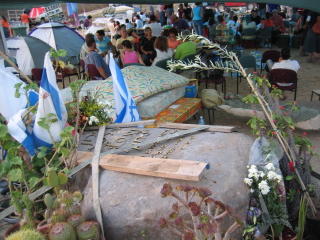Starting today, you can read my disengagement story online.
And if you found the Moving Memorial post below moving or memorable, now you can get all the facts from the AP; see what a proper journalist writes when confronted by a self-proclaimed refugee exploiting his own grief to bend the government to his will: Gaza Withdrawal Creates New Refugees.
*
Wednesday, August 31, 2005
Tuesday, August 30, 2005
Running Commentary
I'm transfixed by images of the devastation Katrina has caused. But I can't just sit watching TV, so here's my digital knitting.
Whenever I run on the beach here, things amaze or delight me. Yesterday I tried to document some of them.
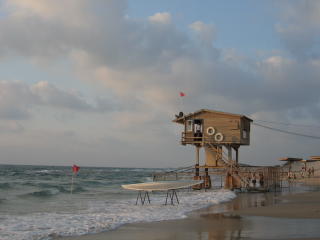
The only lifeguard station on the beach here

Shade trees
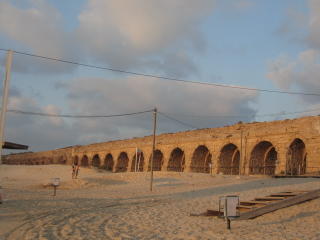
Note on the left that sand has piled up against the remains of the Roman aqueduct, caught in the setting sun's rosy glow.
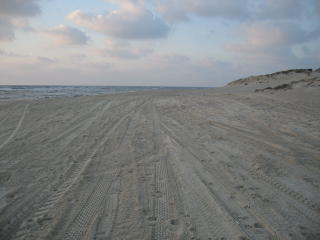
All these tire tracks on the beach help explain why Israel's sea turtle population has declined by 80%. They try to return to the beaches of their birth to lay eggs, but the lights and noise of late-night tailgate parties scare them off and they swim out, return, flee again, and eventually die of this exhausting loop. Or they swallow plastic bags they think are jellyfish and die of choking or blockage. If a cluster of eggs should actually make it to the sand, the 4x4s crush them. I've seen two dead turtles on the sand, each about two feet long. Conservation experts try to redirect the turtles to the few protected beaches, and sometimes they find eggs and relocate them. More information on the turtles here.
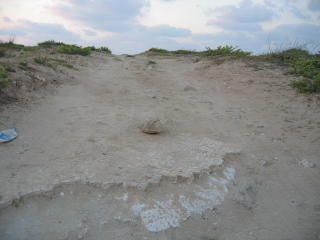
So many antiquities, so little time: mosaic floor half-buried in a beach road.

View of Jassa, Arab fishing village.
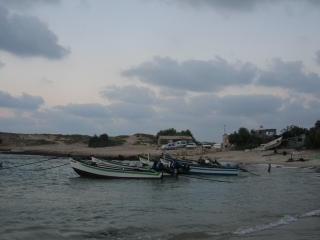
Jassa fishing boats
*
Whenever I run on the beach here, things amaze or delight me. Yesterday I tried to document some of them.

The only lifeguard station on the beach here

Shade trees

Note on the left that sand has piled up against the remains of the Roman aqueduct, caught in the setting sun's rosy glow.

All these tire tracks on the beach help explain why Israel's sea turtle population has declined by 80%. They try to return to the beaches of their birth to lay eggs, but the lights and noise of late-night tailgate parties scare them off and they swim out, return, flee again, and eventually die of this exhausting loop. Or they swallow plastic bags they think are jellyfish and die of choking or blockage. If a cluster of eggs should actually make it to the sand, the 4x4s crush them. I've seen two dead turtles on the sand, each about two feet long. Conservation experts try to redirect the turtles to the few protected beaches, and sometimes they find eggs and relocate them. More information on the turtles here.

So many antiquities, so little time: mosaic floor half-buried in a beach road.

View of Jassa, Arab fishing village.

Jassa fishing boats
*
Seeing the Mundane in the Mundane
Sunday, August 28, 2005
A Moving Memorial
Hundreds of Gaza settlers are staying in hotels around Israel, waiting not for their houses, but for their temporary houses. About 40 families from Elei Sinai have refused to stay in a hotel, unwilling to participate in the proposed three-stage shuffle from hotel to stopgap house to eventual real housing. Of all those who feel wronged by the Disengagement, these people may be most entitled to their anger. Elei Sinai was founded by settlers forcibly removed from Yamit, a Sinai outpost, when Israel returned the peninsula to Egypt in 1982. This is the second time their elected officials have evicted them upon expiration of their strategic usefulness.
Camped out in a dirt lot by the highway near Yad Mordechai, a major junction near Gaza, the refuseniks demand immediate relocation to temporary housing and eventual resettlement on a strip of pricey beachfront. They won’t even visit a hotel to take showers, for fear the government would make media hay of how it’s providing access to running water. For now, they drink and wash from water tanks.
Surrounded by dome tents and vehicles, the heart of the encampment is about 100 feet by 60, its edges loosely defined by a shade cloth hanging over the dusty jumble of camp cots, sleeping bags, chairs, pets, and people. Lots of people. During the day, adults argue and pray and slumber, and their kids fight and play and read, and everywhere hangs a haze of despair and anger. I haven’t visited a Palestinian refugee camp, but there must be similarities. Where the Palestinians have little choice, however, these Jews are exaggerating their straitened circumstances to shame the government into surrendering better land and treatment to them than anybody else is getting.
But what parent willingly subjects children to such misery and uncertainty? I watched a little girl, maybe nine years old, fussing over a cockatoo. She’d hold it and kiss it, whisper to it, feed it seeds from her palm, even dunk its reluctant head into a styrofoam cup to make it drink. Occasionally she cried, silent and poker-faced as tears ran down her dusty cheeks. At those moments she’d crush the cockatoo to her own birdlike little chest and rock from side to side. When she let go, the bird would shake itself off, fan its clipped wings, roll its head like a boxer, and then flap back up to perch on her shoulder. The girl’s mother lay on a nearby cot, staring at the sky through shade cloth, waiting.
I visited Elei Sinai a week before the evacuation. In any town, a few streets define the perimeter. In settlements, these margins form a frontier on the frontier where houses overlook razor-wire fences and then the hostile land beyond. Not many years ago, Palestinian intruders killed a young woman and her boyfriend on one of Elei Sinai's edge streets. Her father and the town commemorated her memory with an enormous boulder that stood at the perimeter of a sideyard facing the spot where she'd died.
At the perimeter of the Yad Mordechai encampment, I found an open trailer loaded with bric-a-brac: houseplants, lamps, abstract sculptures, framed portrait photos, and some wilting bouquets. In the center, almost hidden by the thicket of mementos, lay the dead girl's monument, on its back, facing the sky.
A dog lay in the dust, tethered to the trailer by a short leash and ignoring the dirty stale bread by his water bowl. I'm usually quick to lecture neglectful pet owners, but words failed me.
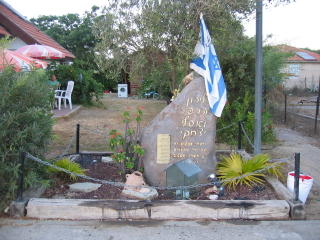
August 11, 2005
Camped out in a dirt lot by the highway near Yad Mordechai, a major junction near Gaza, the refuseniks demand immediate relocation to temporary housing and eventual resettlement on a strip of pricey beachfront. They won’t even visit a hotel to take showers, for fear the government would make media hay of how it’s providing access to running water. For now, they drink and wash from water tanks.
Surrounded by dome tents and vehicles, the heart of the encampment is about 100 feet by 60, its edges loosely defined by a shade cloth hanging over the dusty jumble of camp cots, sleeping bags, chairs, pets, and people. Lots of people. During the day, adults argue and pray and slumber, and their kids fight and play and read, and everywhere hangs a haze of despair and anger. I haven’t visited a Palestinian refugee camp, but there must be similarities. Where the Palestinians have little choice, however, these Jews are exaggerating their straitened circumstances to shame the government into surrendering better land and treatment to them than anybody else is getting.
But what parent willingly subjects children to such misery and uncertainty? I watched a little girl, maybe nine years old, fussing over a cockatoo. She’d hold it and kiss it, whisper to it, feed it seeds from her palm, even dunk its reluctant head into a styrofoam cup to make it drink. Occasionally she cried, silent and poker-faced as tears ran down her dusty cheeks. At those moments she’d crush the cockatoo to her own birdlike little chest and rock from side to side. When she let go, the bird would shake itself off, fan its clipped wings, roll its head like a boxer, and then flap back up to perch on her shoulder. The girl’s mother lay on a nearby cot, staring at the sky through shade cloth, waiting.
I visited Elei Sinai a week before the evacuation. In any town, a few streets define the perimeter. In settlements, these margins form a frontier on the frontier where houses overlook razor-wire fences and then the hostile land beyond. Not many years ago, Palestinian intruders killed a young woman and her boyfriend on one of Elei Sinai's edge streets. Her father and the town commemorated her memory with an enormous boulder that stood at the perimeter of a sideyard facing the spot where she'd died.
At the perimeter of the Yad Mordechai encampment, I found an open trailer loaded with bric-a-brac: houseplants, lamps, abstract sculptures, framed portrait photos, and some wilting bouquets. In the center, almost hidden by the thicket of mementos, lay the dead girl's monument, on its back, facing the sky.
A dog lay in the dust, tethered to the trailer by a short leash and ignoring the dirty stale bread by his water bowl. I'm usually quick to lecture neglectful pet owners, but words failed me.

August 11, 2005
Saturday, August 27, 2005
Dead Sea Scrolling
Three weeks ago, my cousin Z. and I drove to the Dead Sea, one of the world's natural wonders and among my favorite places anywhere. The same evaporation that's caused its hypersalinity has left behind an ever-widening shore filled with varied geological phenomena, among them spontaneous pools just south of Mineral Beach. Such pools are common around the Dead Sea, but only a few are easily accessible via service roads. They form when spring water wells up and saturates the loose soil, which then collapses, forming a void that the water fills. At least I think that's what happens.
With time, the pools either expand into ponds ...
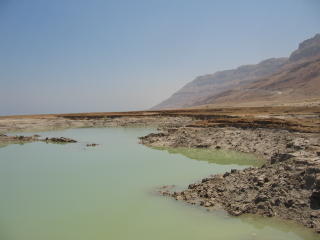
or become so encrusted with salt that they essentially freeze ...
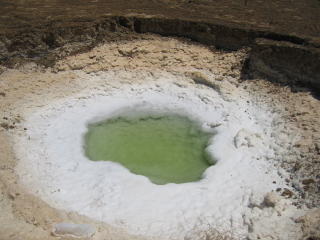
or dry up completely.

These volunteer bodies of water are as salty and hot as the Dead Sea itself, but much quieter and harder to reach.
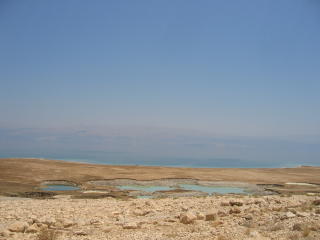
And stranger.
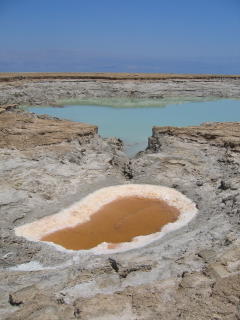
Some are simply not inviting.

Others are.

We chose to defile just one.
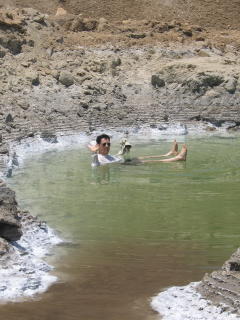
Note the white thing in my right hand. (Click on the image to expand it.) It's a flake of soft salt crystal that formed on the surface of the pool. Once I disturbed the water, all the salt flakes sank,
Deçà, delà
Pareil à la
Feuille morte.
Yep, just like that.
Worse still, our feet stirred up black mud from the floor of this once tranquil green pool, so that by the time we left, the water had turned brown. Note the stain creeping up from the bottom of the photo. The very act of enjoying something destroys it. Fortunately, traffic to these pools is minimal.
Why's that? Well, after you get past the warning signs and the lack of roads and the big rock fields, the salty mud around the pools themselves becomes hotter than summer asphalt, which means you must wear sandals until the very last moment before entering the water. Of course, once your feet are bare and you're hopping around to avoid searing them, out come the knife-sharp salt crystals. No hyperbole: My foot is still healing from the salt knives. And then there's the quicksand ... though there's less of it in the dry season.
Would I go back? In a second.
Z. had a somewhat harder time of it ...
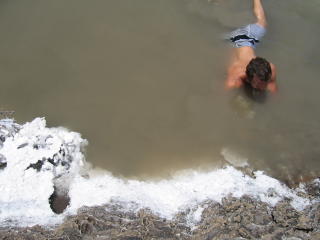
but he agreed the excursion away from civilization was well worth its discomforts.
Afterward, we slouched in and paid our shekels for the mediated Dead Sea experience at Mineral Beach, which involves a parking lot, crowds, and lockers, yes, but also the delightfully dopey tradition of slathering black mud all over oneself, basking in hot mineral baths, and floating under the watchful eye of perhaps the least necessary lifeguard on Earth. If you stand in deep water, your shoulders and even chest bob well above the surface. To clarify this point, note that the photo above shows me floating. Should you attempt to swim, you appear to be supported by an invisible surfboard. Drowning seems impossible. If, however, you are so foolish or misled as to actually dive into this miraculous water, you will experience intense eye pain, go blind for a few minutes, and excite comment from everybody within 100 feet, one or two of whom will escort you to the outdoor showers all the while asking why you have done such a colossally stupid thing. Or so I hear.
Dried Fruit Ethics Test
On the way back we were starving. Flat-out ravenous. We pulled over at the date shack we'd seen on our way to the beach. (In case anybody reading this feels a burning need to launch yet another online matchmaking service, yes, I am willing to license the proprietary term Date Shack ™.) It was cool and dusty under the palm frond roof, wind flapping through the fabric walls. The dates were there -- hard, soft, yellow, black, in boxes, au naturel -- but the people weren't. Nor were the prices posted.
Conundrum. An ethical test from on high? How do you buy something when you don't even know what to pay? I called for help. "Hey! I'm here to buy dates! Anybody here?" Silence. Then I saw a few bills and coins on the table, tucked under a dish, and realized sales were being conducted on the honor system. So we estimated the value of the dates, left what seemed like just a little too much money, and drove away, marveling at the mysteries of the Holy Land.
One of the date varieties was among the best I've ever had: meaty, dense, and complexly flavored. The others were so dry, so very nearly inedible, that when I offered one to a guest a few days later, she bit down on it, failed to dent it, looked at me reproachfully, and asked, "Are you making fun of me? This is like a rock." And it was. I tossed the lot of them.
Dead Sea Redux
Yesterday, three weeks hence, I returned to the Dead Sea with a new set of cousins: A. from DC and her kids, also A. (16) and A. (19). En route, we talked about visiting the wild pools, but given the pain they'd caused my hearty 25-year-old cousin, I thought it might all be too much for this crew. So we went for the highly mediated experience at Ein Gedi, next to which Mineral Beach looks rustic. Ere 30 years ago, developers perched an enormous concrete structure on a bluff and installed within and around it such niceties as changing rooms, massage cabanas, a gift store, a swimming pool, baths of varying temperatures and mineral concentrations, and even a courtesy shuttle bus -- if you can accurately use words like "courtesy" or "bus" to describe anything towed by a tractor. Twenty years ago there was no bus; the beach was a short walk from the building. But the trip grows longer every year as the water level drops.
A. (19) was delighted to pose in the water reading a newspaper. His enthusiasm was almost infectious, reminding me of my own visits to the Dead Sea when I was, harrumph harrumph, his age.
I went and bought a beer and applied the mud and read the paper. Soon enough, A. (19) showed up and followed suit, and then we sat around jawjacking and watching mud dry. Eventually, his mom and sister wandered out and joined in the spirit of things. After socializing a little, I languorously rinsed off in the most blissful of showers, a torrent of hot sulfurous springwater gurgling and tumbling endlessly from an oversized spout.
After a few more therapeutic dips, a couple laps around the swimming pool, and a final freshwater shower, I sat in the lobby and waited calmly for the rest of our party, suffused with a sense of enormous well-being. Is it the calming minerals that make you feel good? The sub-sea level atmospheric pressure? The beer?
Lost and Found
On the way back, speeding high above the sea, I pulled off the road on a whim to take in the view. The sun was already behind the cliffs near Qumran, and the still water reflected a pastel sunset off the hazy sky and Jordan mountains. Yup, it was sublime. And then I approached the edge of the cliff.
Down the hill, resting in the dirt about 20 feet below me, were six pieces of luggage: a couple roller suitcases, two knapsacks, and two very girly bags, one tiny, plaid, and hard-sided, the other made of pink fabric with leather fittings. At first I didn't quite register them. Then I focused and realized they weren't empty. They weren't even dusty. They were full and still gleamed with the crispness of valued possessions. I slid sideways down the hill to the biggest one, loose dirt and rocks filling my sandals.
Bag number one held just a jumble of clothes. The little plaid bag held a cornucopia of expensive cosmetics and dozens of daily wear contact lenses. I yelled up to the cousins, who stopped their good-natured bickering and gathered at the cliff's edge above to shout questions. The son, who as we've already seen is a goer, slid halfway down the hill. I tossed up a bag. As he rifled through it for ID, I noticed still more expensive cosmetics strewn across the rocks and dirt, their little mirrors broken and powder cakes flung from plastic housings. It was all so pathetic. I kept imagining how miserable the victims must have been, stripped not only of their money and jewelry but of clothes and makeup and contact lenses too. I gathered up all the things and shoved them into the nearest bags, and then we started hauling up the booty.
When everything was on level ground, we set to work looking for IDs. Incongruously, a pleather-bound Daytimer crammed with scribbled dollar figures and daily temperatures and phone numbers swam to the fore amid D&G undies and Chanel compacts. We decided it belonged to an obsessive-compulsive orthodox Jew from Maryland, prompting endless speculation and a series of basically fruitless phone calls to some of the numbers he'd recorded. At one point I reached Shlomo Jessel, an orthodox Jew formerly of Toronto who now lives and works as a psychologist here in Israel. He was very interested in our quest and attempted to congratulate me in religious terms for my efforts. I pointedly replied that I am not religious and was pursuing this good deed because I'm ethical and not for any notions of godliness, thank you.
Breakthrough. One of the knapsacks contained a te'udat ze'ut, or national ID card, bearing the photo, name and address of a striking young brunette in Jerusalem: Devorah. We loaded the bags and ourselves into the car, called 114 and got her number.
She was cheered by our news. The stuff had been stolen that very afternoon from a rental car parked at Ein Gedi -- precisely where we'd been parked. One of her friends called me back and spoke French, consistent with the French ID tag on the one of the bags and all the fancy French makeup. We agreed to meet in Jerusalem within the hour.
Second Date
On our way past the Date Shack™ earlier, describing the honor system transaction to the cousin, I had thought up a little experiment in human nature. Set aside three days at the Shack with predictably similar revenues. Day one, operate as normal. Day two, leave the stand unattended but with prices clearly marked. Day three, no attendant, no signs. Compare revenues and inventory at the end of each day. How clever of me, I thought. Pointless? Hey, so was the Post-It before it was indispensable.
We stopped at the Date Shack™, where a prematurely wizened, sun-darkened man was on duty, assisted by two round-cheeked offspring who approached the car bearing samples of hard, pale, fresh dates. Not yet wizened. A. told her kids not to eat them, but I was hungry, so cholera be damned.
While they went to get Cokes next door, I learned that a kilo package such as I had taken on my last visit goes for NIS 40, or about $4 pound. I told the proprietor about that visit, and asked why he'd left the place unattended. The kids were delinquent, that's why. He was so delighted by my story, he explained it to his kids in Arabic. We were on such a roll that I told him about my experiment, and while its theoretical nature seemed to elude him, his reply rendered the idea moot. Not only was he quite sure that he makes more money when actually running the Shack, he'd never even seen the money I'd left him. Someone else had stolen it. So much for human nature. So much for my career as a social scientist.
In any case, his extraordinary salesmanship would throw off any such comparison. I walked away with a huge bag of assorted date varieties still on their stalks, way more than I'd wanted, many of them not yet dry and therefore an acquired taste (not yet acquired by me). We'll have dates for weeks.
CSI: Qumran
And now back to our show. Suddenly everyone in the car was a forensic specialist. Shlomo Jessel called back with more info on Daytimer loser Bernard Abady (as in "I'm glad we only found luggage and not Abady"). I assured Shlomo I'd located an email address for the guy and would be pursuing that path.
Then I asked Shlomo about something I'd been wondering. Does he use religious elements in his psychology practice? When relevant, he said. The car was by that point trapped in a checkpoint bottleneck at the entrance to Jerusalem, so I had plenty of time to talk. Not sure how interesting it was to the Triple A. I asked Shlomo if his religious patients had suffered abnormally high levels of anxiety or depression over the Gush Katif trauma. No more than might be expected, he said. The conversation kept evolving as we drove through the checkpoint and into the city, even addressing whether the thugs who'd poured acid on the soldiers in Kfar Darom might be called religious.
Shlomo invited me to visit him or even stay over with his family some night at their moshav near Modi'in. People here offer invitations like that on a regular basis. It's so alien to me. In the US we might agree to meet someone for coffee at a neutral location if we really think they're great, but here it's all about slumber parties with near-strangers ... all the odder because nobody really lives more than two hours away from anybody else in this minute little country.
Miss Navigation
While we were wrapping it up, my cousin kept telling me to turn right, because she thought the Central Bus Station, our rendezvous point with the French girls, had moved. But I knew it was to our left. I finally managed to push and bully way my way through downtown traffic, only to get a call from the French girls saying they'd thought to simplify my drive by walking to the bus stop at the edge of town -- precisely where A. had been trying to tell me to go. So A. was right for the wrong reasons, and les girls had done something wrong for the right reasons. Huh.
Eventually they showed up -- three charming, modestly yet fashionably dressed little Francaises and one guy, all happy to see their stuff again but troubled by what had been stolen. I felt compelled to explain just how improbable it was that I had found their belongings. Why stop at that turnout? Why approach the edge? Why bother checking the bags? Why bother rifling through their stuff? Well, OK, I didn't say that last part. We had a long polyglot exchange and eventually my cousins ambled back, armed with a kassamful of Pringles, and we wrapped it up. I had thought they might at least shower me with chaste little kisses for such valor, but religious chicks won't even shake your hand. They're saving their chaste little kisses for marriage. Here they are:
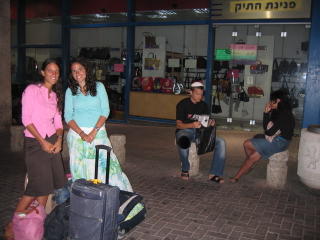
Post script. I am still puzzling over the meaning of this episode. A. calls it a "Beshert day" (beshert = "meant to be" in Yiddish), but that doesn't answer anything for me. What was the purpose of the events that led to my meeting four French kids under the clock at the Central Station and restoring to them their stolen possessions? Was it to set an example for every person under 20 who was touched by this scene, namely the junior American cousins and all the French kids? Is it just that I'm nosy and afflicted by do-gooderitis. Am I still repaying my karmic debt to the two Mormons who, 20 years ago, pulled over on the 101 at 11pm north of Pismo Beach and helped me get the car off the road and my carcass to a motel? Or is the world simply random, without cause or purpose, driven by our choices and coincidence? Sure wish I could remember all those books I read so long ago.
Abu Gluttony
From Jerusalem we drove straight to Abu Ghosh, widely reputed to be home to the finest humus in Israel. OK, among the finest humuses in Israel. Leave it to the shekel-a-word pundits to assign categorical winners. I'm tempted to say only that yes, it was great, and cripes, we over-ordered. It might have been OK if A. (16) hadn't been sidelined by a stomach ailment and thus hors de combat. While we hoovered three kinds of humus and a dozen other salads, she morosely picked her way through a plate of white rice. No team spirit.
OK, OK. What about the humus? Superior for three reasons.
1. Hand-mashed, not machine-spun. This critical distinction separates the humus men from the humus, uh, boys.
2. Served warm. Not essential, but much better that way.
3. Flavor, flavor, flavor. Was it the salt, or was it the spices? Perhaps it was the long-cooked ful or chickpeas cascading down the slopes of each little humus mountain. Perhaps it was the side dishes, each a shining example of its genre, and none befouled by mayonnaise. Perhaps it was just the raging hunger I'd worked up after a day of running and driving and swimming and dealing with the absolutely bizarre phenomenon of having two squabbling kids in the backseat.
Quizas, quizas, quizas.
Pater Infamilias
My "Is this my beautiful car? Is this my beautiful life?" moment came at the cranky tail end of our all-day excursion. I'd been driving my cousin and her two kids in a luxury car as dilapidated as my own, silently witnessing their abrasive yet loving family dynamic. I'm not sure just what eventually pushed me over the edge, but heck, we're family. More or less.
So throwing caution to the wind, I told the kids to simmer down back there or I'd make them walk. Or ride on the roof. Not exactly dad-like, I guess. I think though am not sure that their mom was happy to get some backup. Eventually we all came down on A. (19), because he was clearly and consistently the aggressor against his ill little sister. Conduct unbecoming a sophomore. Not sure I made a diff -- who am I to give advice? -- but we segued to a conversation about observance and guilt and motivation, and thus did we carry on all the way back to their hotel.
BTW, the concert on the beach at midnight wasn't really worth writing about, but here's the crowd with the Tel Aviv shore and skyline. That's a fishing pole arcing up on the right.
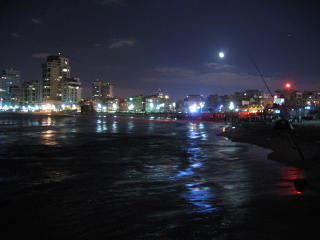
*
With time, the pools either expand into ponds ...

or become so encrusted with salt that they essentially freeze ...

or dry up completely.

These volunteer bodies of water are as salty and hot as the Dead Sea itself, but much quieter and harder to reach.

And stranger.

Some are simply not inviting.

Others are.

We chose to defile just one.

Note the white thing in my right hand. (Click on the image to expand it.) It's a flake of soft salt crystal that formed on the surface of the pool. Once I disturbed the water, all the salt flakes sank,
Deçà, delà
Pareil à la
Feuille morte.
Yep, just like that.
Worse still, our feet stirred up black mud from the floor of this once tranquil green pool, so that by the time we left, the water had turned brown. Note the stain creeping up from the bottom of the photo. The very act of enjoying something destroys it. Fortunately, traffic to these pools is minimal.
Why's that? Well, after you get past the warning signs and the lack of roads and the big rock fields, the salty mud around the pools themselves becomes hotter than summer asphalt, which means you must wear sandals until the very last moment before entering the water. Of course, once your feet are bare and you're hopping around to avoid searing them, out come the knife-sharp salt crystals. No hyperbole: My foot is still healing from the salt knives. And then there's the quicksand ... though there's less of it in the dry season.
Would I go back? In a second.
Z. had a somewhat harder time of it ...

but he agreed the excursion away from civilization was well worth its discomforts.
Afterward, we slouched in and paid our shekels for the mediated Dead Sea experience at Mineral Beach, which involves a parking lot, crowds, and lockers, yes, but also the delightfully dopey tradition of slathering black mud all over oneself, basking in hot mineral baths, and floating under the watchful eye of perhaps the least necessary lifeguard on Earth. If you stand in deep water, your shoulders and even chest bob well above the surface. To clarify this point, note that the photo above shows me floating. Should you attempt to swim, you appear to be supported by an invisible surfboard. Drowning seems impossible. If, however, you are so foolish or misled as to actually dive into this miraculous water, you will experience intense eye pain, go blind for a few minutes, and excite comment from everybody within 100 feet, one or two of whom will escort you to the outdoor showers all the while asking why you have done such a colossally stupid thing. Or so I hear.
Dried Fruit Ethics Test
On the way back we were starving. Flat-out ravenous. We pulled over at the date shack we'd seen on our way to the beach. (In case anybody reading this feels a burning need to launch yet another online matchmaking service, yes, I am willing to license the proprietary term Date Shack ™.) It was cool and dusty under the palm frond roof, wind flapping through the fabric walls. The dates were there -- hard, soft, yellow, black, in boxes, au naturel -- but the people weren't. Nor were the prices posted.
Conundrum. An ethical test from on high? How do you buy something when you don't even know what to pay? I called for help. "Hey! I'm here to buy dates! Anybody here?" Silence. Then I saw a few bills and coins on the table, tucked under a dish, and realized sales were being conducted on the honor system. So we estimated the value of the dates, left what seemed like just a little too much money, and drove away, marveling at the mysteries of the Holy Land.
One of the date varieties was among the best I've ever had: meaty, dense, and complexly flavored. The others were so dry, so very nearly inedible, that when I offered one to a guest a few days later, she bit down on it, failed to dent it, looked at me reproachfully, and asked, "Are you making fun of me? This is like a rock." And it was. I tossed the lot of them.
Dead Sea Redux
Yesterday, three weeks hence, I returned to the Dead Sea with a new set of cousins: A. from DC and her kids, also A. (16) and A. (19). En route, we talked about visiting the wild pools, but given the pain they'd caused my hearty 25-year-old cousin, I thought it might all be too much for this crew. So we went for the highly mediated experience at Ein Gedi, next to which Mineral Beach looks rustic. Ere 30 years ago, developers perched an enormous concrete structure on a bluff and installed within and around it such niceties as changing rooms, massage cabanas, a gift store, a swimming pool, baths of varying temperatures and mineral concentrations, and even a courtesy shuttle bus -- if you can accurately use words like "courtesy" or "bus" to describe anything towed by a tractor. Twenty years ago there was no bus; the beach was a short walk from the building. But the trip grows longer every year as the water level drops.
A. (19) was delighted to pose in the water reading a newspaper. His enthusiasm was almost infectious, reminding me of my own visits to the Dead Sea when I was, harrumph harrumph, his age.
I went and bought a beer and applied the mud and read the paper. Soon enough, A. (19) showed up and followed suit, and then we sat around jawjacking and watching mud dry. Eventually, his mom and sister wandered out and joined in the spirit of things. After socializing a little, I languorously rinsed off in the most blissful of showers, a torrent of hot sulfurous springwater gurgling and tumbling endlessly from an oversized spout.
After a few more therapeutic dips, a couple laps around the swimming pool, and a final freshwater shower, I sat in the lobby and waited calmly for the rest of our party, suffused with a sense of enormous well-being. Is it the calming minerals that make you feel good? The sub-sea level atmospheric pressure? The beer?
Lost and Found
On the way back, speeding high above the sea, I pulled off the road on a whim to take in the view. The sun was already behind the cliffs near Qumran, and the still water reflected a pastel sunset off the hazy sky and Jordan mountains. Yup, it was sublime. And then I approached the edge of the cliff.
Down the hill, resting in the dirt about 20 feet below me, were six pieces of luggage: a couple roller suitcases, two knapsacks, and two very girly bags, one tiny, plaid, and hard-sided, the other made of pink fabric with leather fittings. At first I didn't quite register them. Then I focused and realized they weren't empty. They weren't even dusty. They were full and still gleamed with the crispness of valued possessions. I slid sideways down the hill to the biggest one, loose dirt and rocks filling my sandals.
Bag number one held just a jumble of clothes. The little plaid bag held a cornucopia of expensive cosmetics and dozens of daily wear contact lenses. I yelled up to the cousins, who stopped their good-natured bickering and gathered at the cliff's edge above to shout questions. The son, who as we've already seen is a goer, slid halfway down the hill. I tossed up a bag. As he rifled through it for ID, I noticed still more expensive cosmetics strewn across the rocks and dirt, their little mirrors broken and powder cakes flung from plastic housings. It was all so pathetic. I kept imagining how miserable the victims must have been, stripped not only of their money and jewelry but of clothes and makeup and contact lenses too. I gathered up all the things and shoved them into the nearest bags, and then we started hauling up the booty.
When everything was on level ground, we set to work looking for IDs. Incongruously, a pleather-bound Daytimer crammed with scribbled dollar figures and daily temperatures and phone numbers swam to the fore amid D&G undies and Chanel compacts. We decided it belonged to an obsessive-compulsive orthodox Jew from Maryland, prompting endless speculation and a series of basically fruitless phone calls to some of the numbers he'd recorded. At one point I reached Shlomo Jessel, an orthodox Jew formerly of Toronto who now lives and works as a psychologist here in Israel. He was very interested in our quest and attempted to congratulate me in religious terms for my efforts. I pointedly replied that I am not religious and was pursuing this good deed because I'm ethical and not for any notions of godliness, thank you.
Breakthrough. One of the knapsacks contained a te'udat ze'ut, or national ID card, bearing the photo, name and address of a striking young brunette in Jerusalem: Devorah. We loaded the bags and ourselves into the car, called 114 and got her number.
She was cheered by our news. The stuff had been stolen that very afternoon from a rental car parked at Ein Gedi -- precisely where we'd been parked. One of her friends called me back and spoke French, consistent with the French ID tag on the one of the bags and all the fancy French makeup. We agreed to meet in Jerusalem within the hour.
Second Date
On our way past the Date Shack™ earlier, describing the honor system transaction to the cousin, I had thought up a little experiment in human nature. Set aside three days at the Shack with predictably similar revenues. Day one, operate as normal. Day two, leave the stand unattended but with prices clearly marked. Day three, no attendant, no signs. Compare revenues and inventory at the end of each day. How clever of me, I thought. Pointless? Hey, so was the Post-It before it was indispensable.
We stopped at the Date Shack™, where a prematurely wizened, sun-darkened man was on duty, assisted by two round-cheeked offspring who approached the car bearing samples of hard, pale, fresh dates. Not yet wizened. A. told her kids not to eat them, but I was hungry, so cholera be damned.
While they went to get Cokes next door, I learned that a kilo package such as I had taken on my last visit goes for NIS 40, or about $4 pound. I told the proprietor about that visit, and asked why he'd left the place unattended. The kids were delinquent, that's why. He was so delighted by my story, he explained it to his kids in Arabic. We were on such a roll that I told him about my experiment, and while its theoretical nature seemed to elude him, his reply rendered the idea moot. Not only was he quite sure that he makes more money when actually running the Shack, he'd never even seen the money I'd left him. Someone else had stolen it. So much for human nature. So much for my career as a social scientist.
In any case, his extraordinary salesmanship would throw off any such comparison. I walked away with a huge bag of assorted date varieties still on their stalks, way more than I'd wanted, many of them not yet dry and therefore an acquired taste (not yet acquired by me). We'll have dates for weeks.
CSI: Qumran
And now back to our show. Suddenly everyone in the car was a forensic specialist. Shlomo Jessel called back with more info on Daytimer loser Bernard Abady (as in "I'm glad we only found luggage and not Abady"). I assured Shlomo I'd located an email address for the guy and would be pursuing that path.
Then I asked Shlomo about something I'd been wondering. Does he use religious elements in his psychology practice? When relevant, he said. The car was by that point trapped in a checkpoint bottleneck at the entrance to Jerusalem, so I had plenty of time to talk. Not sure how interesting it was to the Triple A. I asked Shlomo if his religious patients had suffered abnormally high levels of anxiety or depression over the Gush Katif trauma. No more than might be expected, he said. The conversation kept evolving as we drove through the checkpoint and into the city, even addressing whether the thugs who'd poured acid on the soldiers in Kfar Darom might be called religious.
Shlomo invited me to visit him or even stay over with his family some night at their moshav near Modi'in. People here offer invitations like that on a regular basis. It's so alien to me. In the US we might agree to meet someone for coffee at a neutral location if we really think they're great, but here it's all about slumber parties with near-strangers ... all the odder because nobody really lives more than two hours away from anybody else in this minute little country.
Miss Navigation
While we were wrapping it up, my cousin kept telling me to turn right, because she thought the Central Bus Station, our rendezvous point with the French girls, had moved. But I knew it was to our left. I finally managed to push and bully way my way through downtown traffic, only to get a call from the French girls saying they'd thought to simplify my drive by walking to the bus stop at the edge of town -- precisely where A. had been trying to tell me to go. So A. was right for the wrong reasons, and les girls had done something wrong for the right reasons. Huh.
Eventually they showed up -- three charming, modestly yet fashionably dressed little Francaises and one guy, all happy to see their stuff again but troubled by what had been stolen. I felt compelled to explain just how improbable it was that I had found their belongings. Why stop at that turnout? Why approach the edge? Why bother checking the bags? Why bother rifling through their stuff? Well, OK, I didn't say that last part. We had a long polyglot exchange and eventually my cousins ambled back, armed with a kassamful of Pringles, and we wrapped it up. I had thought they might at least shower me with chaste little kisses for such valor, but religious chicks won't even shake your hand. They're saving their chaste little kisses for marriage. Here they are:

Post script. I am still puzzling over the meaning of this episode. A. calls it a "Beshert day" (beshert = "meant to be" in Yiddish), but that doesn't answer anything for me. What was the purpose of the events that led to my meeting four French kids under the clock at the Central Station and restoring to them their stolen possessions? Was it to set an example for every person under 20 who was touched by this scene, namely the junior American cousins and all the French kids? Is it just that I'm nosy and afflicted by do-gooderitis. Am I still repaying my karmic debt to the two Mormons who, 20 years ago, pulled over on the 101 at 11pm north of Pismo Beach and helped me get the car off the road and my carcass to a motel? Or is the world simply random, without cause or purpose, driven by our choices and coincidence? Sure wish I could remember all those books I read so long ago.
Abu Gluttony
From Jerusalem we drove straight to Abu Ghosh, widely reputed to be home to the finest humus in Israel. OK, among the finest humuses in Israel. Leave it to the shekel-a-word pundits to assign categorical winners. I'm tempted to say only that yes, it was great, and cripes, we over-ordered. It might have been OK if A. (16) hadn't been sidelined by a stomach ailment and thus hors de combat. While we hoovered three kinds of humus and a dozen other salads, she morosely picked her way through a plate of white rice. No team spirit.
OK, OK. What about the humus? Superior for three reasons.
1. Hand-mashed, not machine-spun. This critical distinction separates the humus men from the humus, uh, boys.
2. Served warm. Not essential, but much better that way.
3. Flavor, flavor, flavor. Was it the salt, or was it the spices? Perhaps it was the long-cooked ful or chickpeas cascading down the slopes of each little humus mountain. Perhaps it was the side dishes, each a shining example of its genre, and none befouled by mayonnaise. Perhaps it was just the raging hunger I'd worked up after a day of running and driving and swimming and dealing with the absolutely bizarre phenomenon of having two squabbling kids in the backseat.
Quizas, quizas, quizas.
Pater Infamilias
My "Is this my beautiful car? Is this my beautiful life?" moment came at the cranky tail end of our all-day excursion. I'd been driving my cousin and her two kids in a luxury car as dilapidated as my own, silently witnessing their abrasive yet loving family dynamic. I'm not sure just what eventually pushed me over the edge, but heck, we're family. More or less.
So throwing caution to the wind, I told the kids to simmer down back there or I'd make them walk. Or ride on the roof. Not exactly dad-like, I guess. I think though am not sure that their mom was happy to get some backup. Eventually we all came down on A. (19), because he was clearly and consistently the aggressor against his ill little sister. Conduct unbecoming a sophomore. Not sure I made a diff -- who am I to give advice? -- but we segued to a conversation about observance and guilt and motivation, and thus did we carry on all the way back to their hotel.
BTW, the concert on the beach at midnight wasn't really worth writing about, but here's the crowd with the Tel Aviv shore and skyline. That's a fishing pole arcing up on the right.

*
Thursday, August 18, 2005
Watching Gaza Burn on CNN
I'm sitting on a couch in a Caesarea home as the sun sinks over the Mediterranean and the battle for Gaza rages on CNN. It's not easy for a TV-phobe to stare so fixedly at a screen. But I'm managing. Reminds me of watching the LA riots way back when.
A soldier is trying to cut through loops of concertina wire as teen zealot miscreants hurl oil and dirt at him. Weird blue chemicals have been added to the water cannon. Contrast the vicious behavior of these last holdouts atop a synagogue with that of the solicitous policemen who continued talking to the holdouts in the Neve Dekalim synagogue -- or "mosque" as CNN's geopolitical wizards kept saying.
All but the most elite journalists were evicted from Gaza two days ago, so I beat a retreat after three unpleasant days in the sun. The settlers hate the press by now. I've never felt so vulture-like as when trying to get Gazans to answer questions. In fact, I drove to Kfar Darom three days ago, but two kids at the main gate turned me away.
 "You can't come in."
"You can't come in."
"Who says?"
"The community has decided."
Power-mad, I thought, but intransigent.
So I turned the car around and drove away past two huge tanks.
TV again: The kids raging against the cops and the police are crazed yet curiously gentle in their violence. They'll all go to jail for this. The ironic thing is that few if any of these rebels even lived in Gaza; they're mostly infiltrators, or supporters, or mistannenim, which means sneaking people, a reference to how they bypassed the dozens of roadblocks. When I was down there, some of the sneakers cheerily told me that the sneaking stories were so diverse and inspiring that people inside the settlements had been talking about compiling them into a book. Car trunks played a big role, which makes sense, because none of the border guards ever checked my trunk.
Back to the screen ... Compare this extraordinary openness with how almost any other government on earth would treat such an operation: complete media blackout.
Some of the cops in riot gear look like they've been doused in frosting. The most frosted of them all is beset by the fundamentalist version of soccer hooligans, yet the kids are pretty peaceful; they mostly keep yelling at him and trying to take away his megaphone.
Now the cops are emerging from the synagogue in their underwear on international TV to be doused in bottled spring water. The question is whether they're suffering from a chemical agent flung on them by the protesters, or if they're suffering from the effects of the blue water they sprayed onto the roof, which has been bailed by the bucketful onto the cops attempting to break this final bastion of resistance.
Earlier I heard a police negotiation specialist in Maine, I think, opine that the settlers were holding fire in order to maintain the high road for their future relations with the rest of the country. Someone forgot to tell the Rooftop Kids.
Some annoying things about CNN:
"successive governments" -- how many times will they say that?
"mosques" -- Jews don't pray in mosques. Those buildings are synagogues.
Misidentifying the rabbis in orange vests as local overseers.
"watershed" "watershed" "watershed" "watershed"
"Smoke rising from the Israeli settlement of Neve Dekalim signals to the Palestinians that the patience of the weak wore down the strength of the mighty."
As Danny Ayalon, Israel's US Ambassador, tells CNN the Israeli position, the Hilltop Kids turned Rooftop Kids are being perp-walked past a huge pile of furniture they'd used to barricade the synagogue. Hilltop kids are ultra-rightist settlement youth who literally do live on hilltops, often in mobile homes.
There's something ludicrous about the containers dangling over the roof. They can't touch down, because the building probably wouldn't support them. But they've served their purpose: the cops have conquered the roof and now they're stripping down to their skivvies up there too. And the rebels have been led away.
My secular cousin just called and put everything in perspective. "Ah, they're just kids," she said. "The police didn't need to make such a big deal about them. If they'd left them up there for a week they'd have come down on their own." By those lights, this showdown is an event staged for the benefit of world opinion, which seems to be what the Arab press is sneering.
The sun has set. It's too late for a run. I'm on deadline. Back to work.
Oh, and it turns out the cops were being doused in acid.
*
A soldier is trying to cut through loops of concertina wire as teen zealot miscreants hurl oil and dirt at him. Weird blue chemicals have been added to the water cannon. Contrast the vicious behavior of these last holdouts atop a synagogue with that of the solicitous policemen who continued talking to the holdouts in the Neve Dekalim synagogue -- or "mosque" as CNN's geopolitical wizards kept saying.
All but the most elite journalists were evicted from Gaza two days ago, so I beat a retreat after three unpleasant days in the sun. The settlers hate the press by now. I've never felt so vulture-like as when trying to get Gazans to answer questions. In fact, I drove to Kfar Darom three days ago, but two kids at the main gate turned me away.
 "You can't come in."
"You can't come in." "Who says?"
"The community has decided."
Power-mad, I thought, but intransigent.
So I turned the car around and drove away past two huge tanks.
TV again: The kids raging against the cops and the police are crazed yet curiously gentle in their violence. They'll all go to jail for this. The ironic thing is that few if any of these rebels even lived in Gaza; they're mostly infiltrators, or supporters, or mistannenim, which means sneaking people, a reference to how they bypassed the dozens of roadblocks. When I was down there, some of the sneakers cheerily told me that the sneaking stories were so diverse and inspiring that people inside the settlements had been talking about compiling them into a book. Car trunks played a big role, which makes sense, because none of the border guards ever checked my trunk.
Back to the screen ... Compare this extraordinary openness with how almost any other government on earth would treat such an operation: complete media blackout.
Some of the cops in riot gear look like they've been doused in frosting. The most frosted of them all is beset by the fundamentalist version of soccer hooligans, yet the kids are pretty peaceful; they mostly keep yelling at him and trying to take away his megaphone.
Now the cops are emerging from the synagogue in their underwear on international TV to be doused in bottled spring water. The question is whether they're suffering from a chemical agent flung on them by the protesters, or if they're suffering from the effects of the blue water they sprayed onto the roof, which has been bailed by the bucketful onto the cops attempting to break this final bastion of resistance.
Earlier I heard a police negotiation specialist in Maine, I think, opine that the settlers were holding fire in order to maintain the high road for their future relations with the rest of the country. Someone forgot to tell the Rooftop Kids.
Some annoying things about CNN:
"successive governments" -- how many times will they say that?
"mosques" -- Jews don't pray in mosques. Those buildings are synagogues.
Misidentifying the rabbis in orange vests as local overseers.
"watershed" "watershed" "watershed" "watershed"
"Smoke rising from the Israeli settlement of Neve Dekalim signals to the Palestinians that the patience of the weak wore down the strength of the mighty."
As Danny Ayalon, Israel's US Ambassador, tells CNN the Israeli position, the Hilltop Kids turned Rooftop Kids are being perp-walked past a huge pile of furniture they'd used to barricade the synagogue. Hilltop kids are ultra-rightist settlement youth who literally do live on hilltops, often in mobile homes.
There's something ludicrous about the containers dangling over the roof. They can't touch down, because the building probably wouldn't support them. But they've served their purpose: the cops have conquered the roof and now they're stripping down to their skivvies up there too. And the rebels have been led away.
My secular cousin just called and put everything in perspective. "Ah, they're just kids," she said. "The police didn't need to make such a big deal about them. If they'd left them up there for a week they'd have come down on their own." By those lights, this showdown is an event staged for the benefit of world opinion, which seems to be what the Arab press is sneering.
The sun has set. It's too late for a run. I'm on deadline. Back to work.
Oh, and it turns out the cops were being doused in acid.
*
Gaza Photo Blog: Pre-Evacuation
Some views of Gaza settlements just before the people were cleared out.
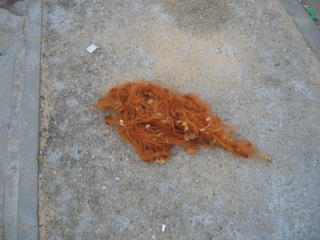 Neve Dekalim was a religious settlement. Once they marry, observant Jewish women wear wigs. Here's a wig that was left behind.
Neve Dekalim was a religious settlement. Once they marry, observant Jewish women wear wigs. Here's a wig that was left behind.
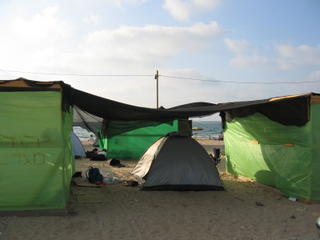 The 20-family settlement Shirat HaYam swelled by dozens as supporters pitched tents and built temporary structures on the sand.
The 20-family settlement Shirat HaYam swelled by dozens as supporters pitched tents and built temporary structures on the sand.
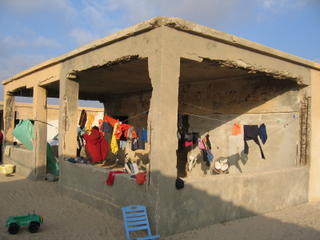 Shirat HaYam was built around a row of crumbling structures. Many years ago, before the Sinai changed hands twice, Egyptian officers would vacation in these beachfront houses.
Shirat HaYam was built around a row of crumbling structures. Many years ago, before the Sinai changed hands twice, Egyptian officers would vacation in these beachfront houses.
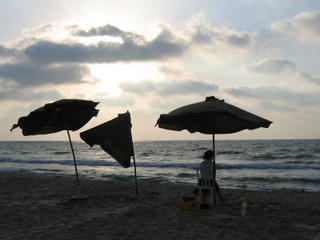 It's a minor miracle no other shutterbugs are in the frame, because this curiously Victorian image of a woman contemplating the sea provoked a photographic feeding frenzy.
It's a minor miracle no other shutterbugs are in the frame, because this curiously Victorian image of a woman contemplating the sea provoked a photographic feeding frenzy.
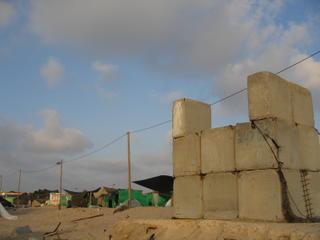 Gaza was littered with these meter-high cubes of concrete, many of them heaped up into fortifications and gun turrets.
Gaza was littered with these meter-high cubes of concrete, many of them heaped up into fortifications and gun turrets.
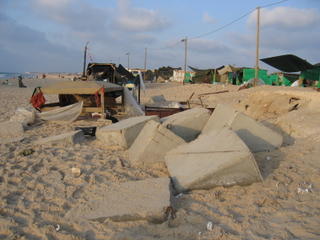 Some of them fell down. Background: tent city.
Some of them fell down. Background: tent city.
 Neve Dekalim was a religious settlement. Once they marry, observant Jewish women wear wigs. Here's a wig that was left behind.
Neve Dekalim was a religious settlement. Once they marry, observant Jewish women wear wigs. Here's a wig that was left behind.  The 20-family settlement Shirat HaYam swelled by dozens as supporters pitched tents and built temporary structures on the sand.
The 20-family settlement Shirat HaYam swelled by dozens as supporters pitched tents and built temporary structures on the sand.  Shirat HaYam was built around a row of crumbling structures. Many years ago, before the Sinai changed hands twice, Egyptian officers would vacation in these beachfront houses.
Shirat HaYam was built around a row of crumbling structures. Many years ago, before the Sinai changed hands twice, Egyptian officers would vacation in these beachfront houses.  It's a minor miracle no other shutterbugs are in the frame, because this curiously Victorian image of a woman contemplating the sea provoked a photographic feeding frenzy.
It's a minor miracle no other shutterbugs are in the frame, because this curiously Victorian image of a woman contemplating the sea provoked a photographic feeding frenzy. Gaza was littered with these meter-high cubes of concrete, many of them heaped up into fortifications and gun turrets.
Gaza was littered with these meter-high cubes of concrete, many of them heaped up into fortifications and gun turrets. Some of them fell down. Background: tent city.
Some of them fell down. Background: tent city.
Subscribe to:
Posts (Atom)




